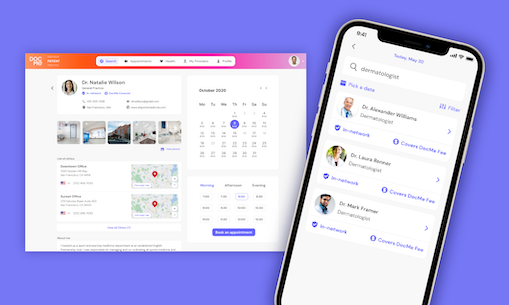Ideon Blog
March 23, 2022
By: Zach Wallens
Powerful from the start: How data integrations helped DocMe launch an innovative digital health app

By Zach Wallens
Director of Content and Communications, Ideon
In this blog post, Ideon profiles one of our newest customers, DocMe, a digital health app based in New York.
It’s no secret that new technologies and companies are driving innovation in the healthcare industry. From mental health and virtual care to digital pharmacies, care navigation, and billing, digital health startups are popping up in all corners of the healthcare ecosystem.
That ecosystem, however, is getting crowded. The race for customers, funding, and publicity is more competitive than ever before.
One way to stand out? Build intuitive, data-driven user experiences powered by third-party data integrations. New York-based DocMe, a brand new digital health app, is one example of an innovation-through-integration approach, leveraging several APIs to create a powerful interface for patients and providers.

Connecting the Dots
Founded in 2021 by private equity investor Tim Gollin, the original concept for DocMe was an app to help consumers shop for doctors, comparing availability, insurance coverage, and prices for specific procedures. Of course, there are existing services, such as ZocDoc, for booking medical appointments.
Gollin quickly realized that a connected patient experience—bringing together disparate data sets within a single platform—could truly differentiate DocMe from competitors. Leveraging third-party integrations, Gollin and his developers understood, would be far more efficient than chasing down data sets and building functionality from scratch.
DocMe streamlined its development by relying on specialized companies to provide data and services it incorporated into its app. “A lot of the data and connections we would have had to build ourselves in the past we can now get from vendors,” Gollin says. “We see ourselves as stringing together little bits of Tinker Toys to build a complete product.”
Indeed, DocMe integrates third-party technology for functions like electronic health records, payments processing, video conferencing, and provider identity verification. And it incorporates multiple sources of data about providers, procedure costs, and—with data from Ideon—insurance networks.
“Ideon provides me with the ability to show consumers which doctors are in their network without them having to go to their insurance company website,” Gollin says. “Doctors don’t even know what networks they are in. We’ve heard lots of stories where people get told on the phone the doctor is in their plan only to discover it’s not. Ideon has the definitive answer.”

This tight integration between services provides patients with an easier, more intuitive experience. Some examples:
- DocMe promises patients that they’ll never have to enter medical information history more than once.
- When someone makes a doctor’s appointment, they not only see available times but also the specific services offered and the price they’ll pay according to the terms of their insurance plan.
- When a patient books an appointment, DocMe will collect the amount not covered by insurance in advance. In other words, patients get a much more transparent market.
DocMe is continuing to add features to its product, integrating data more tightly to save users time. It will use Ideon’s card scanning technology, for example, to extract patients’ network information by simply snapping a photo of their insurance cards.
DocMe is also preparing to roll out in Brazil, Italy, France, and the United Arab Emirates. Some might ask why a small company would spread its resources across different countries, each with its own health care system. Gollin answers that the work done to build integrated capabilities and smooth user experience into DocMe already gives it an advantage in other markets. “The goofy thing is the U.S. system is super complicated,” he says. “Everyplace else is significantly simpler.”
For more information about Ideon’s APIs for digital health and InsurTech platforms, click here.


